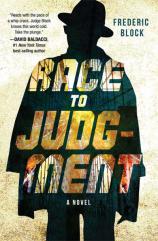Race to Judgment
Review
Race to Judgment
Deep down in their hearts, an inordinate number of attorneys and judges believe that they have what it takes to become the next John Grisham or Scott Turow. Writing a novel is no easy task, but some members of the legal profession achieve their goal.
Retired federal judge Frederic Block is one member of the bar who now has two published books to his credit. Somewhat of a Renaissance man, Block served 23 years as a district court judge in the Eastern District of New York. He wrote about that experience in DISROBED: An Inside Look at the Life and Work of a Federal Trial Judge, and also co-authored an off-Broadway musical, “Professionally Speaking.” To these accomplishments Judge Block has now added RACE TO JUDGMENT, a courtroom-themed novel that will hold your attention from beginning to end. For both lawyers and non-lawyers, the book is a multi-themed joy ride through today’s news and the workings of the American legal system. It even includes a playlist of songs available as a free download.
"This is a wonderful debut. I doubt its structure will allow for a sequel, but Judge Block has the New York canvas and his own personal experiences as background for many more courtroom novels."
Ken Williams, an African-American attorney practicing in New York, has the traditional pedigree of a hero. His career path followed the route that many trial lawyers travel. After a stint as an Assistant United States Attorney, he decided that he would feel more comfortable defending those charged with crimes rather than prosecuting them. His experience with the abuses of the criminal justice system also triggered a desire to right those wrongs and protect those unjustly treated. In addition to being an attorney, Williams is a musician and songwriter. One of his talents is apparently writing country and western songs, which are interspersed throughout the plot.
The main thrust of the novel is Williams’ representation of Troy Jackson, a well-respected high school counselor who has been arrested for a murder that occurred many years before, when Jackson was a teenager with gang connections. The evidence seems quite thin, as the only eyewitness has his own gang ties and criminal history. The scent of a setup is quite strong, and while this one case might provide the solid foundation for an interesting novel, Judge Block adds quite a few additional plot twists and turns to the story. Williams decides to run for District Attorney against a long-entrenched incumbent, which is based on the actual campaign of Ken Thompson, who successfully unseated Charles Hynes in an election campaign that received national attention.
Along the way, RACE TO JUDGMENT hits every New York theme and stereotype one can imagine. A vast array of characters appear in the story, some of whom are fictional but clearly based on real-life New Yorkers. Others are named, including Al Sharpton, many New York politicians and several federal court judges, all of whom have brief cameos. Hasidic Jews, Italians and the Irish also play a role in the story. The city is portrayed with all its splendor and faults. You can almost taste the pastrami and brisket sandwiches that the characters enjoy at their lunchtime meetings.
Judge Block has a number of subplots dotting these pages, including one that is clearly based on some difficult experiences he might have suffered while serving as a judge. In fairness, some of these subplots do not advance the story, but they do add to the flavor of the city and frequently offer important insight into the failures and shortcomings of the criminal justice system.
This is a wonderful debut. I doubt its structure will allow for a sequel, but Judge Block has the New York canvas and his own personal experiences as background for many more courtroom novels. I look forward to his next effort.
Reviewed by Stuart Shiffman on December 8, 2017










